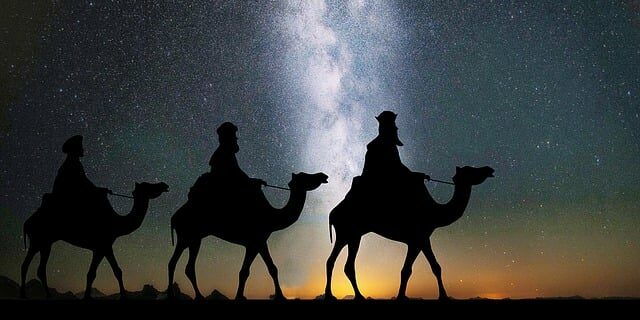Once upon a time in Tunis, there was a well-regarded wealthy merchant who had many shops, a house in the center of town and another summer house in Sidi Bou Said. He also had a country estate on the hill of Sidi Yahia and an olive orchard in Tebourba. He had many servants and workers. Each of his caravans had at least twenty or thirty camels and his merchandise came from every corner of the earth.
The merchant’s wife bore him a son. The child grew up fast and started going to the Quranic school. When the boy finished his third year of school, his father wanted him to become a merchant like him so that he might run his shops after his passing.
Each Friday, the merchant began to bring his son with him to the shop to teach him how to trade and negotiate with people. Sometimes, when a caravan arrived, he would take him to receive and send goods.
When the boy finished his fourth year, his father said to him:
“You have studied enough. From now on, you shall stay in the shop with me and become a merchant.”
His father started leaving him alone in the shop, one time for an hour, another for two hours, trying to get him more familiar with the work. He would sometimes send him alone to the shop pretending to be sick and then come join him after an hour or two. Later, he would leave him for a whole morning alone in the shop, next a whole evening and then for a whole day.
The boy became a true merchant that his father could rely on. His father would go to his country estate for a week or more to inspect the plowmen and leave his son in charge of the shop. He even once left him for a whole summer on his own and his father only came each week to inspect the shops and settle the accounts.
After those days, the merchant decided to send his son to trade in another town. He loaded the camels with goods, sent with him his most professional porters, gave him a horse and told him to go exchange the merchandise.
The young man set out on the road with his caravan and the porters until they reached the desert.
After two or three days, they entered a forest. They walked the whole day and at night, they settled in a place. They had dinner and then slept while one of them stayed up to stand guard.
In the middle of the night, the young man woke up.
“Are you well, Sir?” asked the guard.
“I’m fine,” he said, “I wanted to stroll around for a while.”
He started walking around, while it was still not yet dawn.
Suddenly, he saw something moving on the ground. He got scared for a second and moved back a little. He first thought it was a snake, but as he approached it, he found that it was a very old wolf, so old its teeth had fallen out. It was lying on the ground, unable to move its limbs.
“What is this wolf still living for?”, wondered the young man to himself. “Wouldn’t it be better if I kill it and relieve it from its suffering? How is it surviving, anyways? How does it feed itself? It can barely stand up, let alone go hunt.”
While he was pondering these questions and muttering to himself, he heard a roar. He immediately climbed up the tree the wolf was lying under. As the roaring approached, the man’s heart started beating faster. He then saw an enormous lion advancing, carrying a bull behind it.
Once the lion reached the tree, it lay the bull in front of it and started eating it, crushing its bones into pieces. Once it was full, it went to a nearby pond, drank to quench its thirst, roared a couple more times and then left.
All the while, the young man was holding tightly onto the tree branches and watching closely what was going on.
Later, the wolf started moving, trying to get up. It went to those bones and what remained of the bull and started feeding on it. Once it was full, it lay down to rest. Then in the morning it got up again and went to the pond to drink.
The merchant came down from the tree and went back to his comrades.
“Let us leave,” said he.
“What is the matter? Is everything well?” exclaimed the guard.
“Everything is fine. We shall go back to our town.” replied the young man.
They arrived in town at dawn and the caravan stopped in front of the house. The young man knocked on the door and found his father praying.
“Good morning, father.”
“Good morning, what is the matter? Why are you here? Didn’t you go to the town? Are you tired or did you fall ill?”, asked the father worriedly.
“No, father, I am fine, but I’ll tell you what I have witnessed.”
And so, he related to him the incident of the lion and the wolf.
“If God can bring that helpless animal its food, providing for both the one who works and the one who doesn’t, and since God is the one in charge of distributing wealth to his people, then why should people go through the hardships of working, traveling and taking risks? That is why, dear father, I came back.”
The old man thought for a long time before saying:
“Listen to me carefully, my dear son. I have sent you to go through those hardships, as you say, so that you might become a lion after whom wolves can come to eat. I do not want you to become a hungry wolf surviving on the leftovers of lions. I do not want you to be at the mercy of people. Go back on the road since you still haven’t unloaded your merchandise and people have not seen you yet, lest they laugh at you and me.” said the father.
The young man came back to his senses and said:
“What you say is true, my father.”
He went back to his caravan and set out on the road again.
by Arne

